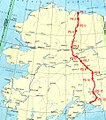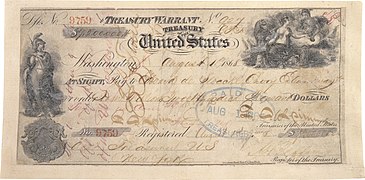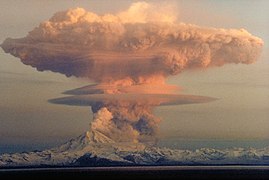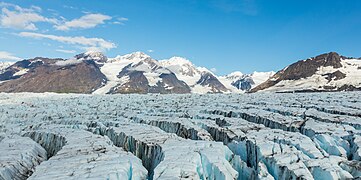Portal:Alaska
 Introduction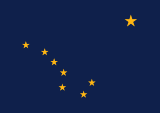   Alaska (/əˈlæskə/ ə-LASS-kə) is a non-contiguous U.S. state on the northwest extremity of North America. It is in the Western United States region. The only other non-contiguous U.S. state is Hawaii. Alaska is also considered to be the northernmost, westernmost, and easternmost (the Aleutian Islands cross the 180th meridian into the eastern hemisphere) state in the United States. It borders the Canadian territory of Yukon and the province of British Columbia to the east. It shares a western maritime border, in the Bering Strait, with Russia's Chukotka Autonomous Okrug. The Chukchi and Beaufort Seas of the Arctic Ocean lie to the north, and the Pacific Ocean lies to the south. Technically, it is a semi-exclave of the U.S., and is the largest exclave in the world. Alaska is the largest U.S. state by area, comprising more total area than the following three largest states of Texas, California, and Montana combined, and is the sixth-largest subnational division in the world. It is the third-least populous and most sparsely populated U.S. state, but is, with a population of 736,081 as of 2020, the continent's most populous territory located mostly north of the 60th parallel, with more than quadruple the combined populations of Northern Canada and Greenland. The state contains the four largest cities in the United States by area, including the state capital of Juneau. The state's most populous city is Anchorage, and approximately half of Alaska's residents live within its metropolitan area. Indigenous people have lived in Alaska for thousands of years, and it is widely believed that the region served as the entry point for the initial settlement of North America by way of the Bering land bridge. The Russian Empire was the first to actively colonize the area beginning in the 18th century, eventually establishing Russian America, which spanned most of the current state and promoted and maintained a native Alaskan Creole population. The expense and logistical difficulty of maintaining this distant possession prompted its sale to the U.S. in 1867 for US$7.2 million (equivalent to $157 million in 2023). The area went through several administrative changes before becoming organized as a territory on May 11, 1912. It was admitted as the 49th state of the U.S. on January 3, 1959. Abundant natural resources have enabled Alaska— with one of the smallest state economies—to have one of the highest per capita incomes, with commercial fishing, and the extraction of natural gas and oil, dominating Alaska's economy. U.S. Armed Forces bases and tourism also contribute to the economy; more than half of the state is federally-owned land containing national forests, national parks, and wildlife refuges. It is among the most irreligious states, one of the first to legalize recreational marijuana, and is known for its libertarian-leaning political culture, generally supporting the Republican Party in national elections. The Indigenous population of Alaska is proportionally the second highest of any U.S. state, at over 15 percent, after only Hawaii. (Full article...) Entries here consist of Good and Featured articles, which meet a core set of high editorial standards.
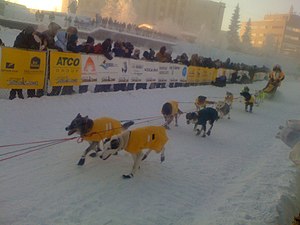 The Yukon Quest, formally the Yukon Quest 1,000-mile International Sled Dog Race, is a sled dog race scheduled every February since 1984 between Fairbanks, Alaska, and Whitehorse, Yukon, switching directions each year. Because of the harsh winter conditions, difficult trail, and the limited support that competitors are allowed, it is considered the "most difficult sled dog race in the world", or even the "toughest race in the world"—"even tougher, more selective and less attention-seeking than the Iditarod Trail Sled Dog Race." The originator envisioned it as "a race so rugged that only purists would participate." In the competition, first run in 1984, a dog team leader (called a musher) and a team of 6 to 14 dogs race for 10 to 20 days. The course follows the route of the historic 1890s Klondike Gold Rush, mail delivery, and transportation routes between Fairbanks, Dawson City, and Whitehorse. Mushers pack up to 250 pounds (113 kg) of equipment and provisions for themselves and their dogs to survive between checkpoints. Each musher must rely on a single sled for the entire run, versus three in the Iditarod. Ten checkpoints and four dog drops, some more than 200 miles (322 km) apart, lie along the trail. Veterinarians are present at each to ensure the health and welfare of the dogs, give advice, and provide veterinary care for dropped dogs; together with the race marshal or a race judge, they may remove a dog or team from the race for medical or other reasons. There are only nine checkpoints for rest, versus 22 in the Iditarod. Mushers are permitted to leave dogs at checkpoints and dog drops, but not to replace them. Sleds may not be replaced (without penalty) and mushers cannot accept help from non-racers except at Dawson City, the halfway mark. (Full article...) TopicsCategoriesSelected article -Eskimo (/ˈɛskɪmoʊ/) is an exonym that refers to two closely related Indigenous peoples: Inuit (including the Alaska Native Iñupiat, the Canadian Inuit, and the Greenlandic Inuit) and the Yupik (or Yuit) of eastern Siberia and Alaska. A related third group, the Aleut, who inhabit the Aleutian Islands, are generally excluded from the definition of Eskimo. The three groups share a relatively recent common ancestor, and speak related languages belonging to the family of Eskaleut languages. These circumpolar peoples have traditionally inhabited the Arctic and subarctic regions from eastern Siberia (Russia) to Alaska (United States), Northern Canada, Nunavik, Nunatsiavut, and Greenland. Some Inuit, Yupik, Aleut, and other individuals consider the term Eskimo, which is of a disputed etymology, to be pejorative or even offensive. Eskimo continues to be used within a historical, linguistic, archaeological, and cultural context. The governments in Canada and the United States have made moves to cease using the term Eskimo in official documents, but it has not been eliminated, as the word is in some places written into tribal, and therefore national, legal terminology. Canada officially uses the term Inuit to describe the indigenous Canadian people who are living in the country's northern sectors and are not First Nations or Métis. The United States government legally uses Alaska Native for enrolled tribal members of the Yupik, Inuit, and Aleut, and also for non-Eskimos including the Tlingit, the Haida, the Eyak, and the Tsimshian, in addition to at least nine northern Athabaskan/Dene peoples. Other non-enrolled individuals also claim Eskimo/Aleut descent, making it the world's "most widespread aboriginal group". (Full article...) Selected picture - The aurora borealis as viewed in Interior Alaska. Photo credit: Joshua Strang (United States Air Force) General imagesThe following are images from various Alaska-related articles on Wikipedia.
Recognized content
Featured articlesGood articles
Featured pictures
Former featured pictures
Related Portals
Related WikiProjectsState facts
State symbols:
Tasks
Associated WikimediaThe following Wikimedia Foundation sister projects provide more on this subject:
Discover Wikipedia using portals |



















